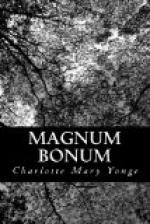David Ogilvie made a sound as if this were very base kind of solace, and his sister did not wonder when she remembered the bright hopes and elaborate theories with which he had undertaken the mastership only nine months ago. He was then fresh from the university, and the loss of constant intercourse with congenial minds had perhaps contributed as much as the dulness of the Kenminster youth to bring him into a depressed state of health and spirits, which had made his elder sister contrive to spend her Easter at the seaside with him, and give him a few days at the beginning of the term. Indeed, she was anxious enough about him, when he went down to the old grammar-school, to revolve the possibility of acceding to his earnest wish, and coming to live with him, instead of continuing in her situation as governess.
He came back to luncheon next day with a brightened face, that made his sister say, “Well, have you struck some sparks?”
“I’ve got some new material, and am come home saying, ’What’s in a name?’”
“Eh! Is it those very new Brownlows, that seemed yesterday to be the last straw on the camel’s back?”
“I wish you could have seen the whole scene, Mary. There were half-a-dozen new boys to be admitted, four Brownlows! Think of that! Well, there stood manifestly one of the old stock, with the same oval face and sleepy brown eyes, and the very same drawl I know so well in the ‘No-a-’ to the vain question, ‘Have you done any Latin?’ And how shall I do justice to the long, dragging drawl of his reading? Aye, here’s the sentence I set him on: ’The-Gowls-had-con-sen- ted-to-accept-a-sum-of-gold-and-retire. They were en- gagged-in-wag—ging out the sum-required, and-’ I had to tell him what to call Brennus, and he proceeded to cast the sword into the scale, exclaiming, just as to a cart-horse, ‘Woh! To the Worsted’ (pronounced like yarn). After that you may suppose the feelings with which I called his ditto, another Joseph Armine Brownlow; and forth came the smallest sprite, with a white face and great black eyes, all eagerness, but much too wee for this place. ‘Begun Latin?’ ’Oh, yes;’ and he rattled off a declension and a tense with as much ease as if he had been born speaking Latin. I gave him Phaedrus to see whether that would stump him, and I don’t think it would have done so if he had not made os a mouth instead of a bone, in dealing with the ‘Wolf and the Lamb.’ He was almost crying, so I put the Roman history into his hand, and his reading was something refreshing to hear. I asked if he knew what the sentence meant, and he answered, ‘Isn’t it when the geese cackled?’ trying to turn round the page. ‘What do you know about the geese?’ said I. To which the answer was, ’We played at it on the stairs! Jock and I were the Romans, and Mother Carey and Babie were the geese.’”
“Poor little fellow! I hope no boys were there to listen, or he will never hear the last of those geese.”




